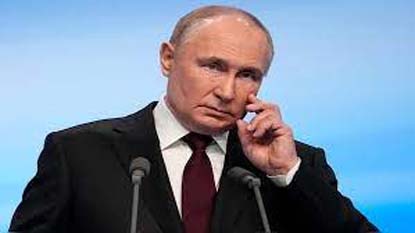In the early hours of Monday, Russian President Vladimir Putin reveled in an unsurprising triumph, with preliminary election results confirming his fifth consecutive term. Despite nominal opposition and severe crackdowns on dissent, Putin’s victory was a foregone conclusion.
On the final day of the election, Russian citizens, with scant room for objection, congregated outside polling stations in response to an opposition call, ostensibly to voice their discontent with Putin’s regime. However, the overwhelming support underscored Putin’s unwavering control over the country’s political landscape, solidifying his reign for another six years.
Putin interpreted the preliminary results as a testament to the populace’s “confidence” and “optimism” in his leadership, although critics viewed them as further evidence of the predetermined nature of the election.
Responding to the outcome, British Foreign Secretary David Cameron criticized the lack of electoral integrity, citing the absence of independent monitoring and limited voter choice.
Public dissent against Putin’s governance or his Ukrainian conflict has been swiftly quashed, with independent media outlets marginalized and opposition figures silenced. The recent demise of Putin’s staunch critic, Alexei Navalny, in a remote penal colony, exemplifies the extent of suppression faced by dissenters.
Despite nominal electoral options, the voting process lacked comprehensive oversight. Official figures from Russia’s Central Election Commission indicated Putin’s commanding lead with the vast majority of precincts reporting.
In this tightly controlled environment, supporters of Navalny rallied for protest voting at noon on Sunday, prompting significant queues at polling stations both domestically and abroad.
Yulia Navalnaya, Navalny’s widow, was among those adhering to the opposition’s call, queuing for hours in Berlin and casting her vote with her late husband in mind. Her message to Putin was unequivocal: cease expecting dialogue, as he is deemed a ruthless autocrat.
However, Putin downplayed the significance of the apparent protest, commending citizen participation as per the scheduled calls for voting.
Notably, Putin made a rare mention of Navalny during a post-election press conference, revealing his prior knowledge of a proposal for Navalny’s release, contingent upon his continued exile.
While some Muscovites expressed dissent through voting, others, like Dmitry Sergienko, conveyed contentment with the status quo, reflecting the pervasive influence of state-controlled media in shaping public opinion.
Voting occurred over three days across various polling stations and online platforms. Concurrently, Russian authorities reported Ukrainian military aggression, highlighting the precarious geopolitical landscape.
Despite stringent controls, instances of vandalism and disruption at polling stations were reported. However, law enforcement crackdowns on dissenting voices and procedural irregularities marred the electoral process.
Political arrests and intimidation tactics were rampant, limiting avenues for dissent. Nevertheless, Ivan Zhdanov, representing Navalny’s Anti-Corruption Foundation, deemed the opposition’s protest campaign a success.
Beyond Russia, expatriate communities staged demonstrations outside diplomatic missions, echoing discontent with Putin’s policies, particularly the invasion of Ukraine.
In summary, despite Putin’s apparent electoral mandate, dissenting voices persist both within Russia and abroad, challenging the narrative of unchallenged authority.









